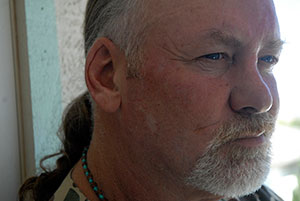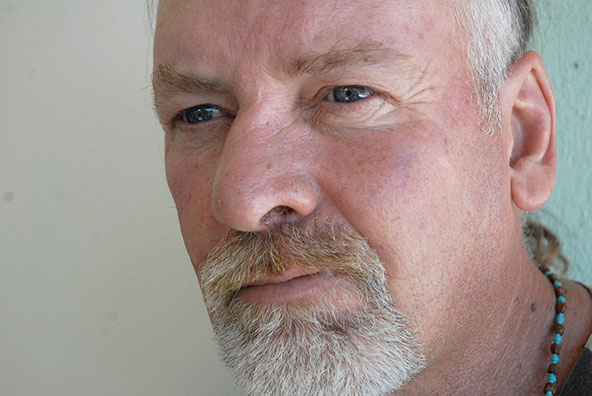Tamara Tirado Over the moon from thecatholicsun on Vimeo.
COTTONWOOD — Joseph Daniel Callaghan couldn’t stop fiddling with his white flip-flops. They’re busted. One of the straps has come apart and, no matter how much Scotch tape he sticks on there, it isn’t going to stay put. But he won’t quit trying.

Callaghan, 52, spent years on the streets after returning from military service in Asia. He spent time in an amphibious unit smuggling prisoners of war out of a country he preferred not to be mentioned.
When he got back to the United States in the 1980s, things didn’t go his way. Being a clean-cut military guy, he did find jobs. But he had a harder time with “civilians.”
“There’s a lot of people still bitter against the military,” Callaghan said. “They used to look at you and say, ‘you’re just a killer.’”
He drank too much and used drugs and wound up on the streets. The worst thing about that, he said, was that homeless people stole from other homeless people.
“They steal the sugar out of your tea and come back for the milk,” he said. He spent time on skid row in Los Angeles, where he said kids would set sleeping homeless people on fire with lighter fluid. “They were so high on drugs, they didn’t know what they were doing.”
Callaghan lived on beers, burgers and a pack of smokes. “It’s not flashy being out there,” he said.
Callaghan heard he could get $10 an hour working labor in Cottonwood, so he headed over. That didn’t work exactly as he planned either, so, he spent time living “in the bush” behind a McDonald’s in Sedona and in the forest near Cottonwood.
“You can’t listen to your radio — What are you going to do? Plug it into a tree?” he said.
Living on the streets for such a long time is probably why he wouldn’t just throw away those white flip-flops. But, thanks to Catholic Charities’ “Forward Steps Permanent Supportive Housing Program,” he doesn’t live on the streets anymore.
Callaghan met Catholic Charities’ Eliza Louden just outside St. John Vianney Parish in Sedona. “They have a food bank every Thursday,” he said.
“You guys need sleeping bags? Tents?” Callaghan recalled her asking. “I hadn’t showered in like two weeks.”
Callaghan met Louden again a few months later. “Community meal, every Monday night, St. Andrew’s Episcopal,” he said. “Old folks go just for the chin wag.”
Louden offered to bring him to Flagstaff for an overnight gathering for Veterans — a military stand-down. There, Callaghan received a lot of camping equipment, new boots and a portable cookout. It stressed him out. “How am I going to get back to Sedona with all this gear?” The anxiety led him to a moment of clarity and by the time Louden picked him up the next day, Callaghan had resolved to quit drinking.
“To me, the way that happened, she’s an angel,” he said.
That was last May. Catholic Charities set Callaghan up with housing and he’s been sober ever since. He even started a 40-hour a week job earlier this month.
‘The Loft’
Louden runs “The Loft,” a day drop-in center for homeless individuals to shower, apply for jobs and do their laundry. There are 65 homeless people in the Cottonwood area, she said, but The Loft sees even as many as 100 people in need. It’s a good way to keep in touch. Many suffer from physical disabilities, said Louden, who also runs “The Lofty News,” a newsletter written by clients.
“These words they write down could be the last thing anyone knows about them,” she said. One homeless person she knew committed suicide after robbing a bank. Another died of a stroke not having received proper medical care.
“Last winter, the remains of a homeless person were found in a bird shed,” Louden said.
“When we can get them into housing, it saves money,” said Janet Conchy, an Americare member who serves with Catholic Charities. She said homeless individuals rely on the emergency room for medical needs caused by their living conditions. The cost adds up.
“We have the ability to solve this problem,” Conchy said, adding that the homeless population in Cottonwood is fairly static. “They are our homeless neighbors.”
A lot of times people who live on the streets don’t think to check food for expiration dates. They’ll eat whatever they find while “dumpster diving.”
Carol Quasula, site director for Catholic Charities Community Services in Prescott, said the community needs to “step up” to take care of this problem. Catholic Charities can house nine individuals and families for $80,000 a year, but they can’t do it without community support.
“We need employers to give these people a chance,” she said. “So many of them, if they had the opportunity to work, they would.”
Once they’re housed, things start to change. Individuals that were once preoccupied with where to stash their belongings and where they might find a warm place to sleep that night can instead concentrate on quitting bad habits and starting a new life.
That’s been key for Callaghan.
“You’re not sleeping with one eye open,” he said of having an apartment. “People say, ‘Joe? Is that you?’ Yeah! I’m over the moon.”
He has a clean home and he says he’s going to keep it. His job will allow him to pay his bills, and he won’t be wasting his money on booze.
It’s been a long journey. He’s been shot, stabbed and even hit by a car. “I didn’t get these scars from eating candy bars.”
He’s gotten up and he’s fallen down again. But this time, Joseph Daniel Callaghan is up for good.
“Being sober has given me that clarity to understand what’s going on,” Callaghan said. “This is what I prayed for. I’m one of the happiest men in the world right now.”
Catholic Charities
Catholic Charities Community Services is marking 80 years of service to those in need.
To learn more or to get involved, visit: catholiccharitiesaz.org







